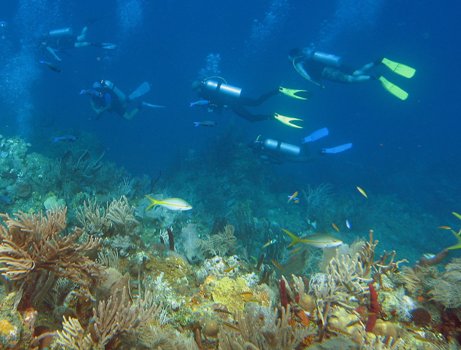10 May 2010(back to press release archive)
Pioneering work by a UK based conservation organisation looks set to help start the process of getting a remote part of the planet declared a Marine Protected Area.

An underwater research team
(c) Biosphere Expeditions
High resolution version of this image available on request from
Biosphere Expeditions has just completed the baseline research of the coral reefs off the remote and mountainous Musandam peninsula of Oman in the Strait of Hormuz.
This is the first time this area has been surveyed, bordered as it is by massive developments in the United Arab Emirates. This high level of construction is believed to have had a considerable negative impact on the marine environment of the neighbouring area.
But the results of the first survey which have just been released are encouraging.
“We discovered corals here that appear to endure extremely hard conditions, and a higher abundance of snappers than in any other part of the region,” said Kathy Wilden from Biosphere Expeditions.
“While this is only the beginning, and we will be returning to the area later this year, it is a start to building a case at government level for this to be declared a Marine Protected Area.
“It is important we act now to protect the area as development in the region will increase.”
The announcement from Biosphere Expeditions comes hot on the heals of the call by world renowned Oceanographer and 2009 TED prize winner, Dr Sylvia Earle, to establish a global network of marine protected areas which she describes as ‘ hope spots to save and restore the blue heart of the planet’. Currently, less than one percent of the oceans are under legal protection.
“There is no doubt Sylvia Earle’s speech has put the whole question of marine conservation higher up the agenda,” said Kathy Wilden. “The marine environment is very fragile and if not protected will be gone for ever.”
A full copy of the project report can be found at www.biosphere-expeditions.org/reports.
For more information, please visit www.biosphere-expeditions.org or email
> back to press release archive
